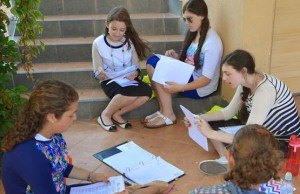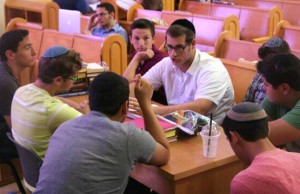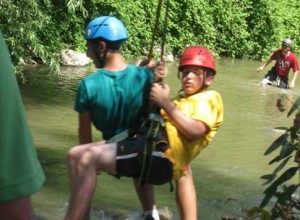 Shoshana and Dr. Yitzchok Schechter heard about Hamas’s rampant rocket attacks while driving their daughter to the airport. Ayelet, 15, was flying to Israel for NCSY’s Michlelet program. Their son, Yoni, 17, had left the day before to learn in the NCSY Kollel. NCSY promised their children the “best summer ever.” The Schechters expected nothing less.
Shoshana and Dr. Yitzchok Schechter heard about Hamas’s rampant rocket attacks while driving their daughter to the airport. Ayelet, 15, was flying to Israel for NCSY’s Michlelet program. Their son, Yoni, 17, had left the day before to learn in the NCSY Kollel. NCSY promised their children the “best summer ever.” The Schechters expected nothing less.
Neither one of us had the notion not to let them go,” says Shoshana, assistant professor of Bible at Yeshiva University’s Stern College for Women and director of the Basic Jewish Studies Program.
Rocket fire is not a foreign concept to the Schechters. At the height of the Gulf War, Yitzchok decided to stay for the full year of learning at Yeshivat Kerem B’Yavneh, unperturbed by the daily barrage of scud missiles. Shoshana, a Stern College student at the time, organized a plane full of classmates. They flew to Israel – solely to show their support.
Their son’s induction into current life in Israel came fast and personal. As Yoni and his Kollel group stood before the Kotel during their first night there, the scream of the missile-warning siren sounded. “I asked him, ‘What did you do,’” tells his mom. “’We ran for cover,’ he told me. ‘But you’re at the Kotel; where do you run?’ He said they found an arch and put their hands over their head.’” She asked her son if he was afraid. “He told me, ‘for the first couple of seconds it was scary, but then I looked around and saw all types of Jews; we were all in this together. I felt this is where I wanted to be.’”
 “They are connecting to Eretz Yisrael, Torat Yisrael, and Am Yisrael in a deeper way than they would have, had they gone on the program at another time,” says Shoshana. Their father concurs. “Israel is not just a place where you go for fun and vacation,” says Yitzchok, a clinical psychologist, director of the Center for Applied Psychology in Monsey, and one of the original participants of the NCSY Kollel. “Chazal teach us that we have to also participate in the sorrow of the Jewish people.”
“They are connecting to Eretz Yisrael, Torat Yisrael, and Am Yisrael in a deeper way than they would have, had they gone on the program at another time,” says Shoshana. Their father concurs. “Israel is not just a place where you go for fun and vacation,” says Yitzchok, a clinical psychologist, director of the Center for Applied Psychology in Monsey, and one of the original participants of the NCSY Kollel. “Chazal teach us that we have to also participate in the sorrow of the Jewish people.”
A lesson their children are living by. Yoni, along with the other Kollel boys, have dedicated their learning to individual chayalim, and each chabura is learning for specific army units. Ayelet and her Michlelet friends put together care packages for an army base, consisting of requested items such as soap, shampoo, socks, candy, chocolates, as well as personal letters of encouragement and gratitude.
 Due to the current turbulent situation, of the 1,105 teens who signed up for Summer 2014, only 535 of them actually went to Israel; two of the ten programs brought NCSY’s summer inspiration elsewhere. The 206 participants who signed up for The Jerusalem Journey (TJJ), relocated to the West Coast and EURO ICE remained in Europe, cancelling its stop to the Holy Land.
Due to the current turbulent situation, of the 1,105 teens who signed up for Summer 2014, only 535 of them actually went to Israel; two of the ten programs brought NCSY’s summer inspiration elsewhere. The 206 participants who signed up for The Jerusalem Journey (TJJ), relocated to the West Coast and EURO ICE remained in Europe, cancelling its stop to the Holy Land.
With the participants’ safety in mind, NCSY transferred the Kollel and Michlelet programs to the northern city of Chispin, in the heart of the Golan. Most of the programs’ dedicated teachers travel three and a half hours to get to the students.
“It’s a tough situation; NCSY had to change their entire itinerary,” says Shoshana. “On one level I feel badly they aren’t having the experience that they would have had. But they are all thrilled to be there.”
According to the Schechters, their children are acquiring firsthand knowledge of the kind of life-balance one has to maintain when surrounded by violent enemies. “They’re banana boating on the Kineret and making camouflage tzistzis for the chayalim, playing basketball and saying Tehillim, going to waterparks, and making shiva calls,” says Shoshana. “They’re also creating stronger bonds with each other because of the difficult situation.”
The Schechters say they feel more personally connected to Israel knowing their children are there. One Erev Shabbat, Yoni called after having paid a shiva call to a family of a fallen IDF soldier. He told her repeatedly, “Mommy, he’s a year older than I am.” Ayelet shared how the chayalim couldn’t get over the fact that American girls came to Israel during wartime when they could have easily stayed at home, and that they were so happy to be there. “They’re sacrificing their lives for our land and our people,” she said, “and they’re thanking us for coming to show we care.”
The Schechters acknowledge that once the program ends, leaving Israel won’t be easy for their children. “It’s going to be very hard to watch the news [and be so far away]. [Nonetheless], it’s a real zechus to be there now. It’s an experience they will carry with them forever.”
NCSY Summer 2014 update: Both the Kollel and Michlelet programs have returned to the Jerusalem area.
The words of this author reflect his/her own opinions and do not necessarily represent the official position of the Orthodox Union.



